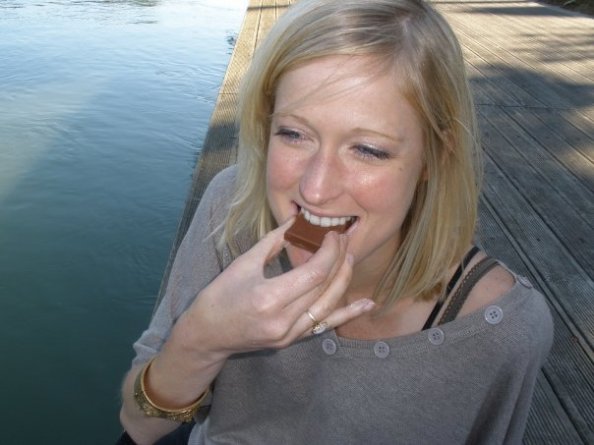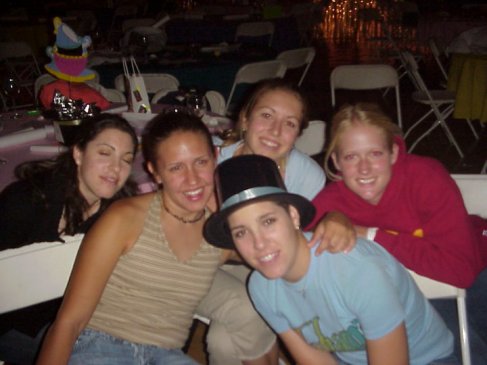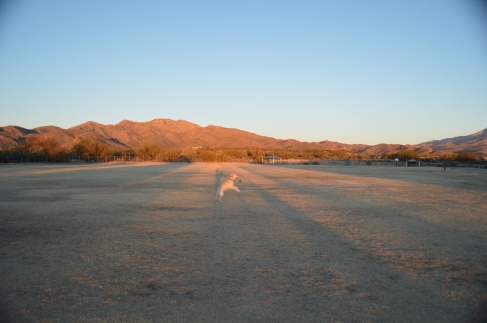“Once a cheater always a cheater.” So said the instructor in my gym class this afternoon when Robin Thicke came on his playlist. Some people, for whatever reason (how they were raised, even their brain wiring), are just more programmed to cheat, like others compulsively lie or steal. But for the rest of us, can mistakes in a marriage just “happen”?
Last weekend my fiance Olivier went on a bachelor party in Miami with a good friend of ours, who is getting married to one of my closest friends from college. I’m not the jealous type. I swear. But while they were away, Olivier called me and at one point alluded to dancing at a club. I then asked him half-jokingly (but really more half not) if it was with a little college girl in a Miami-style short-short skirt. He laughed and moved on without answering my question. Which stirred up anxiety, as my mind wandered from my original scenario (which probably happened) to what else might have gone down at this bachelor party: Some little college girl in a short skirt grinding her rear on Olivier, and then maybe kissing him. And then maybe they end up in the hotel room by themselves…my mind traipsed to places it never usually goes and I didn’t want it to be. (In any case, none of the above actually happened — apparently he spent a good amount of time reading the New Yorker by the pool and swimming laps — which, knowing Olivier, is a much more probable scenario.) But as I was at dinner last week with the bachelor, my friend his fiance, and Olivier, it initiated an interesting pre-marital conversation: Is cheating a red line? And what would you do if you cheated, or you found out your significant other cheated?
Our friends, who are getting married in April, have been going to pre-marital counseling for the past several months (something we’re hesitating on doing — in the words of a sex/relationship writer I work with, “why stir the pot? that sh*t will inevitably come up later.”). But chock it up to the counseling, my girlfriend had a quick and definitive answer to the red line question. No. And for him, “pink.”
Her rationale: If my husband cheats, I must be doing something wrong that drove him to do it. Or, at the very least, there must be something wrong in our relationship that needs fixing. So instead of focusing on his behavior and how he hurt me, let’s get to the bottom of whatever’s wrong and fix it. His rationale: sometimes sh*t happens. People make mistakes, but it doesn’t necessarily mean there’s a larger problem. They did agree that either way, they’d work through it.
Later I talked it over alone with Olivier. I already knew his position on telling your significant other you cheated: He doesn’t want to know; thinks it’s purely selfish to tell the other person, and you do it because you have a guilty conscience. But at the same time, I have a very hard time imagining a scenario where either one of us could sleep with someone without making a conscious decision to hurt the other person. As I told Olivier, if you’re out dancing with friends and someone plants a smooch on you, that’s one thing…but going back to their room is a whole other level — less of a mistake than something calculated and extremely self-centered. And really, like my friend said, if the person who does that consciously decides to hurt their partner, there must be a problem in the relationship that needs fixing.
Yet people are not really meant to be monogamous, from a purely evolutionary perspective. But we do it because when when you find the right person who really is your best friend, you want that person in your life — all of it. And not sleeping around when you’re not both fully on board with an “open” relationship is a sign of respect.
So while I think that any cheating that happens in the first few years of a relationship is a bigger problem that needs to be discussed (whether or not you tell the person you were unfaithful), it’s not a stretch to imagine one or both people in a couple getting bored 20 years down the road. Wanting to spice things up. Sure, you can do things that bring you emotionally closer. But is there ever a point where you become OK with the idea of seeing other people, to make both of you happier (see: “Hall Pass“)? Or you just keep on trying to work things through?
As I told Olivier, I don’t know, we don’t have enough experience to know what happens after you’ve been married for 5, 10, 20 years. It’s got to be tough; marriage is work! So for now, I’m OK not having an answer. But as I told Olivier, I just hope that when issues like this do arise years later, that we both have enough respect for each other to talk them through and do our best to find a solution that works for both of us.
Do you think cheating is a “red line”? Or do you believe in the “Hall Pass”?



